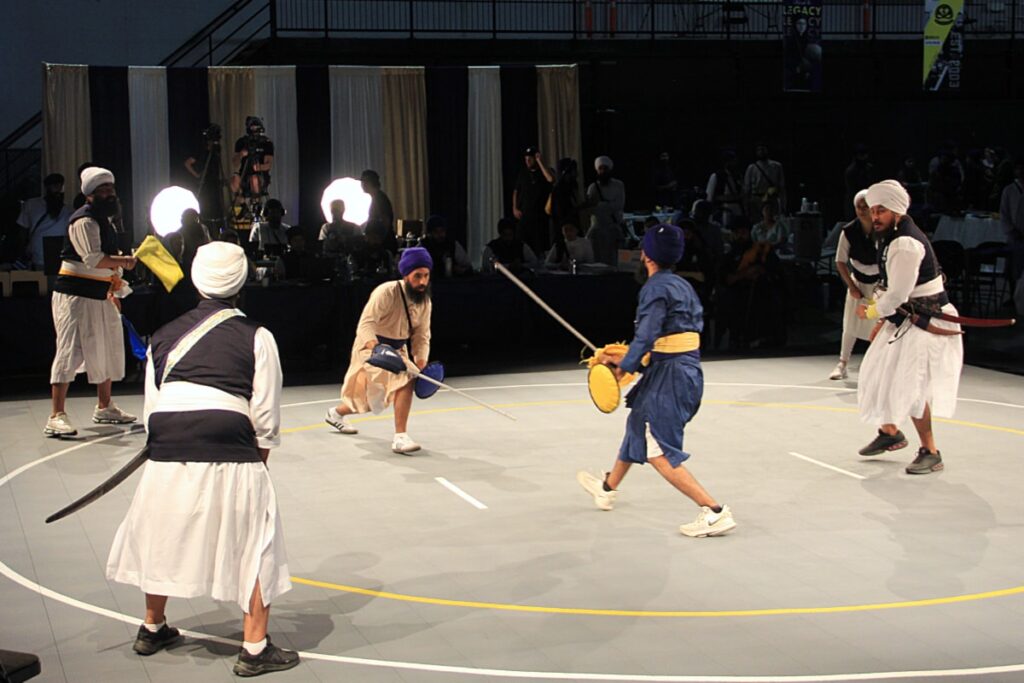A Sikh martial arts display was held at the Cloverdale Agriplex from July 6-7.
More than 120 athletes competed in the second Damdama Gatka Championships. This Sikh martial arts competition attracted athletes from around the world and over 2,700 spectators over the two-day event.
Event organizers hope the international competition will “spark” interest among even more people.
“A large number of people came yesterday,” said Vaneet Kaur, public relations manager for the Damdama Gatka Championships. “Today we are holding the championship and will announce the winners later.”
After the qualifying matches on 6 July, the tournament progressed to the knockout rounds with quarter-finals, semi-finals and then the finals on 7 July for four categories – Junior Men's and Women's (15 years and over) and Senior Men's and Women's (18 years and over).
Gatka
Gatka is a traditional Sikh martial art and is considered a martial arts education. The sport is ancient, originating in Punjab in the late 1400s. The martial art saw a revival in the 1960s and 1970s, with the International Gatka Federation being founded in 1982. Gatka has grown significantly since then.
Closer to home, the Shaheed Baba Deep Singh Ji Gatka Akala (SBDSJGA) was founded in Surrey in 2003 and has grown significantly over the past two decades. The Damdama Gatka Championship was organised by the SBDSJGA.
Gatka fighters will compete one-on-one in rounds with two minutes of stoppage time.
In this Gatka Championship Farisoti competition. FThe ri is a leather shield, Sothie Competitors try to hit their opponent with a bamboo stick. Players hit their opponent with the stick and score points by hitting different parts of the body: above the waist, 2 points, below the waist, 1 point, and a hit on the back, 3 points. If the defender blocks the strike, no points are awarded. When one player strikes, he has to stop and let the other player strike. But the exchange happens very quickly.
“It's a game of speed and skill,” said Jasmeet Kaur Multani, a competitor in the senior women's division. “You try to confuse your opponent.”
Multani has been practicing Gatka for just under two years and competed in a competition over the weekend, but lost to a friendly competitor from the same Akala (SBDSJGA).
Multani, from Surrey, said she had been fascinated by the sport for several years but never made the decision to actually take up the practice until she recently re-watched it at Surrey's Vaisakhi Parade, where she saw people of all ages and skill levels performing, and realised she could take up the sport.
“Seeing that and now being able to be a part of it (Gatka) was really emotional,” Multani said.
She only decided to start competing competitively earlier this year, which meant she only had three months of competitive training leading up to the championships, but she is proud of her efforts and how she was able to improve her skill level so significantly in such a short amount of time.
Elevated
This year, the SBDSJGA raised the production level for its second annual tournament, and Kaul said this year's participants appreciated the Agriplex facilities and the increased quality the SBDSJGA brought to the championship.
“Some people were in shock,” Kaul explains, “and they were like, 'Oh my God! This is amazing.' The facilities here are so different to any convention you'll see in North America. They don't have the production level that we do.”
Kaul said the SBDSJGA was trying to raise the profile of Gatka and attract more people, both competitors and spectators, to the martial art.
“I want the players to be more enthusiastic, take it more seriously and practice better,” Kaul said. “Everyone is taking the sport more seriously and I hope this will encourage more players to want to take up the sport.”
She said the majority of participants were from within Canada, with a few from the U.S. and a few from overseas, but she hopes to see more international participants in the future. This is only the second annual championship, but it has grown significantly since the first.
“We're very happy with the turnout,” Kaul added. “We hope it gets even bigger in the future and we see more players from more parts of the world taking part.”
Inspiration
Kaul said it was the wish of their Akhara (school) founder Bhai Charanjit Singh that inspired the SBDSJGA to start the World Championships.
“Unfortunately, he died young,” Kaul says, “but he brought the practice to Surrey and sparked a passion in a lot of young people.”
She said the SBDSJGA continues his legacy of growing and celebrating the sport.
“This is what he wanted Gatka to be. We just wanted to honour him and his memory and really showcase Gatka and bring his vision to life.”
For more information about the SBDSJGA, visit gatka.online.

